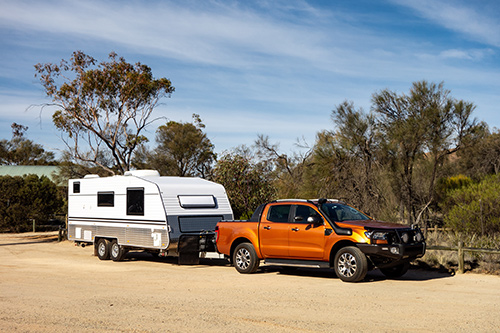
Whether it’s a boat, a house trailer or your trash to the dump, safely towing a trailer requires attention to...
Safety tips for towing a trailer
Here are nine key points for safe trailer towing and long vehicle life
1) Know your weight limits
Make sure your trailer and whatever you’re hauling fall within the towing or hauling capacities of your vehicle. Check the owner’s manual to find the trailer types that your vehicle can haul and the maximum weight it can pull. Use the right trailer hitch and make sure it is hitched correctly.
2) Distribute weight evenly
If your trailer fishtails, back off the gas and see if it stops. If it continues when you accelerate again, check to see how the weight is distributed on the trailer. It may not be distributed evenly from side to side, or else it’s too far back to place sufficient load on the hitch ball.
Pro Tip: Try to carry 5-10% of the trailer load on the hitch. Redistribute the load as necessary before continuing.
3) Ensure the trailer lights work
Connect the brake and signal lights. Double check to make sure the trailer’s brakes, turn signals and tail lights are synchronized with the tow vehicle.
4) Properly inflate the tires
In addition to staying within weight limits for your rig, be sure the tires are in good condition and properly inflated. Be sure to check your wheel bearings, too. An overheated bearing will sideline your rig as fast as a flat tire. Check out this video on bearing maintenance.
5) Know that your vehicle will handle differently
When towing, you’re operating a vehicle combination that’s longer and heavier than normal. Be sure to adjust your driving practices accordingly.
Backing up is tricky, but it’s a skill you can learn. Until you’re experienced, have someone direct you from outside in those tight spots or places where you have limited visibility.
Avoid sudden turns.
When it comes to towing accidents, don’t say, “It can’t happen to me.” Say instead, “It must not happen to me.”
6) Buckle your seat belt
In case your tow vehicle ends up upside down.
7) Trailer towing requires increased stopping distance
It’s a simple matter of physics. When towing, you have more momentum than you would without a trailer. Remember that stopping requires more time and distance. Avoid tailgating and pay attention to what’s happening a little farther down the road than you normally would.
8) Keep your head on a swivel
Maybe you forgot to fasten a chain, secure the hitch or tie down your payload properly. If you’re in a hurry to get home after a long trip, things like that can happen.
Once you’re on the road, frequently check your mirrors to make sure everything looks good back there.
9) Upgrade your transmission protection
Towing places enormous stress on a transmission. In fact, because of the intense heat, towing is probably the number-one killer of transmissions.
For this reason, the “towing package” on many trucks includes a transmission-oil cooler. It also helps to use a high-end synthetic lubricant. Synthetics reduce friction and provide better resistance to high heat, helping the tranny run cooler, shift confidently and last longer.
Source: amsoil.com

